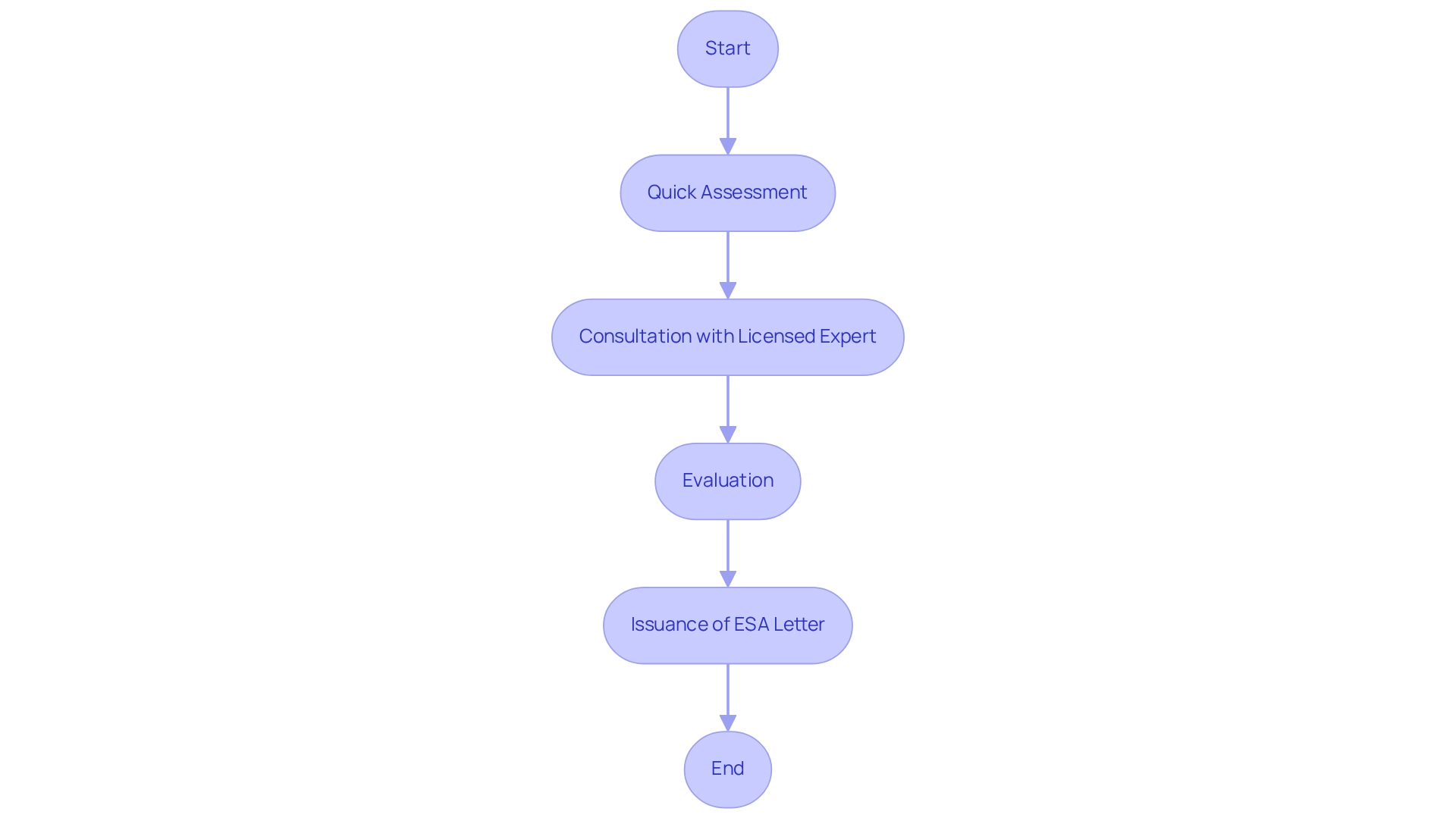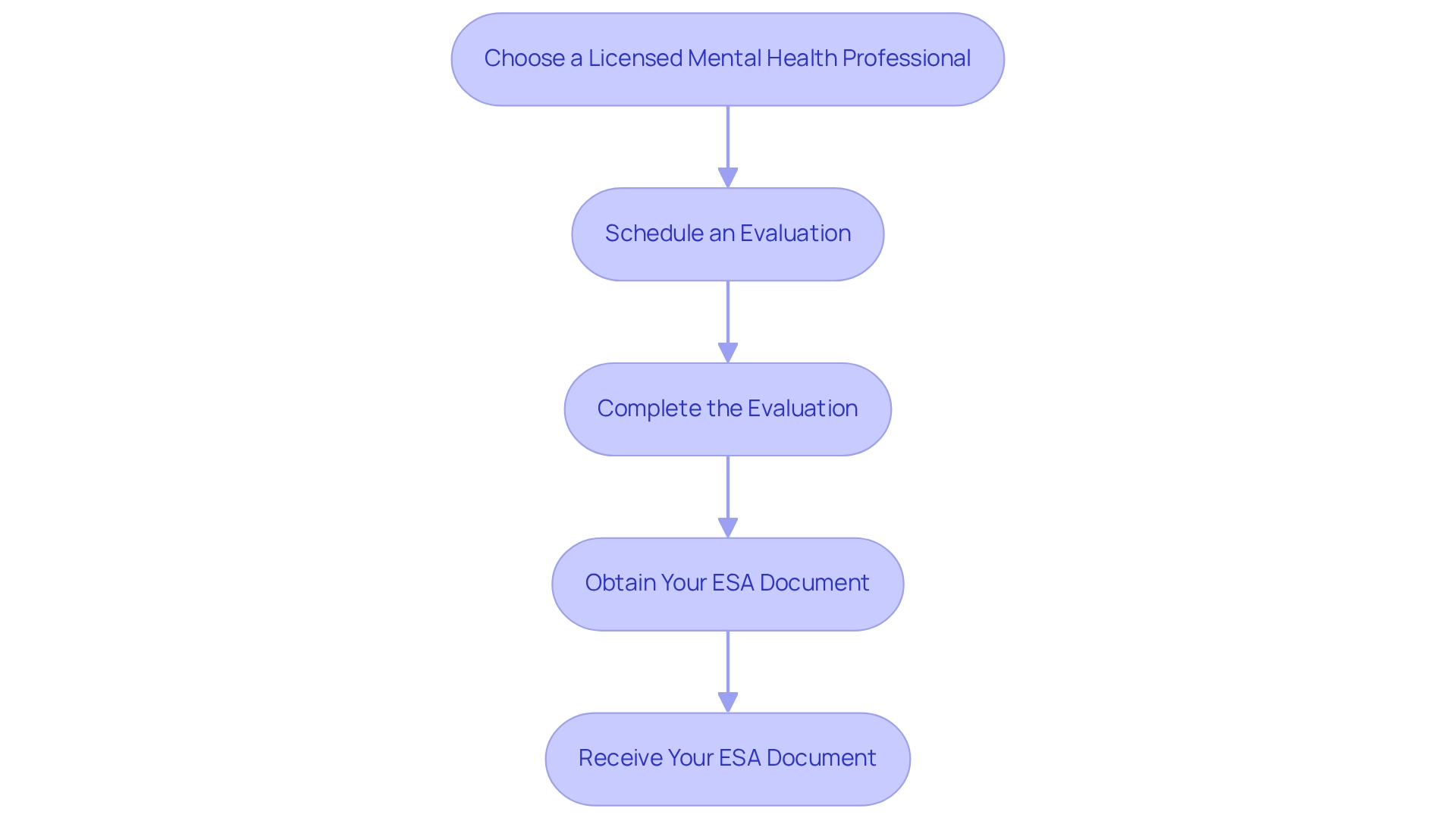

4 Steps on How to Get an Emotional Support Certificate
by Lena Park
Last updated: July 6, 2025
Verified and Approved by:
Angela Morris,
MSW, LCSW
Fact Checked

Overview
Obtaining an emotional support certificate can feel like a daunting task, especially for those grappling with mental health challenges. It is essential to navigate a structured process that begins with selecting a licensed mental health professional. This professional will conduct an evaluation to determine eligibility for an emotional support animal (ESA). If deemed eligible, you will receive an official ESA letter, which serves as a vital document for ensuring your rights in housing and travel situations.
The significance of proper documentation cannot be overstated. For many individuals, the presence of an ESA provides not just companionship, but also essential emotional support during difficult times. This letter can be a beacon of hope, offering legal protections that allow you to travel and live with your beloved animal by your side.
As you consider this journey, reflect on the emotional support that animals can provide. Many have experienced profound changes in their mental well-being through the companionship of an ESA. Knowing that there is a structured path to obtaining this support can bring a sense of relief and empowerment.
Rest assured, you are not alone in this process. There are compassionate professionals ready to assist you, ensuring that your needs are understood and met. Embracing the support of an ESA can lead to a brighter, more fulfilling life, filled with the love and comfort that only an animal companion can provide.
Introduction
In a world where mental health challenges are increasingly recognized, many individuals find themselves navigating the difficult waters of anxiety, depression, and PTSD. These emotional struggles can feel isolating and overwhelming, leaving individuals yearning for comfort and stability. Emotional Support Animals (ESAs) have emerged as vital companions, offering essential emotional support that can alleviate these burdens. Unlike service animals, which are trained to perform specific tasks, ESAs provide a unique form of companionship that can profoundly impact one’s emotional well-being.
Research highlights the significant benefits of animal companionship, illustrating how the presence of an ESA can bring solace and joy during tough times. However, to fully access the advantages of having an ESA, obtaining a legitimate ESA letter is crucial. This letter not only affirms the need for emotional support but also grants individuals the rights they require to secure housing and travel accommodations. Have you ever felt the weight of these challenges? The right support can make all the difference.
This article will explore the purpose of ESAs, the steps to qualify for an ESA letter, and how to navigate potential hurdles in the process. Our aim is to ensure that those in need can access the transformative power of their furry friends, fostering a sense of connection and understanding along the way. You are not alone in this journey; support is available, and together we can find the path to emotional healing.
Understand Emotional Support Animals and Their Purpose
Support Animals (ESAs) play an essential role in providing comfort and assistance to individuals navigating the challenges of psychological or mental health conditions. Unlike service animals, which are specially trained to perform tasks for individuals with disabilities, ESAs primarily offer companionship and emotional stability. They can be particularly beneficial in alleviating symptoms associated with anxiety, depression, PTSD, and other psychological difficulties.
Many individuals with psychological health conditions find solace in the presence of ESAs as part of their therapeutic journey. Mental health professionals underscore the positive effects of animal companionship, highlighting that interactions with pets can significantly diminish feelings of anxiety and loneliness. For example, studies reveal that petting or holding an animal can lead to immediate enhancements in mood and emotional well-being. As Anna M. van Heeckeren, DVM, notes, “Individuals who face challenges with psychological conditions often state that petting or holding their animals assists them in feeling less anxious and lonely.”
The significance of possessing a legitimate ESA letter cannot be overstated, as it opens doors to housing and travel accommodations for those in need. This documentation is vital for individuals residing in pet-restricted environments, empowering them to advocate for their rights under the Fair Housing Act and Air Carrier Access Act. Importantly, only one ESA will be approved for a student to fulfill the intent of the Fair Housing Act, which holds particular relevance for those in educational settings or shared living arrangements.
Moreover, ESAs differ from service animals in that they do not require specialized training for specific tasks. Their primary role is to provide emotional support, which can be life-changing for individuals facing health challenges. As the dialogue around mental health continues to evolve, recognizing ESAs as legitimate sources of support becomes increasingly essential, ensuring that individuals can access the companionship they need to enhance their quality of life.
If you have questions or concerns about how to get an emotional support certificate, we invite you to explore our Frequently Asked Questions (FAQs) section for further guidance. Wellness Wag provides a streamlined online process for individuals to learn how to get an emotional support certificate through their telehealth services, simplifying the journey for acquiring the necessary paperwork. With flexible payment plans starting as low as $32.25 and cashback offers available, these crucial services are made more accessible to those in need. The ongoing concern regarding the misuse of service animal designations highlights the importance of proper documentation, reinforcing the integrity of the designation process.
Get started with your ESA document today!
Determine Your Eligibility for an ESA Letter
To qualify for an ESA letter, individuals must have a diagnosed mental health condition that significantly impacts their daily life. Many face emotional challenges, such as anxiety, depression, and PTSD, conditions that affect millions. Recent statistics reveal that around 31.1% of adults in the U.S. experience anxiety disorders at some point in their lives, underscoring the urgent need for support. Moreover, 17% of survey participants were 55 years and older, indicating the benefits of support animals span across various age groups.
At Wellness Wag, we understand that learning how to get an emotional support certificate can feel overwhelming. That’s why we offer a streamlined online process designed to help you every step of the way. Begin with our quick assessment, where you can share your unique situation and support needs. This personalized approach allows us to tailor our services specifically to you.
Following the assessment, you’ll be connected with a licensed health expert for a compassionate consultation and thorough evaluation to determine your eligibility for an ESA. During this assessment, it’s important to feel comfortable discussing your symptoms and how a support animal could alleviate them. Licensed professionals are dedicated to understanding your mental health history and current challenges, ensuring they can provide the best guidance for your treatment plan.
If the expert concludes that an ESA would be beneficial, they will issue a document affirming your need for an emotional support animal. This letter, written on official letterhead and including the professional’s license details, is crucial for meeting legal requirements for housing and travel accommodations. It’s heartening to see that the number of licensed mental health professionals offering ESA evaluations is increasing, reflecting a growing awareness of the therapeutic benefits that animal companionship can provide. As this landscape evolves, ongoing research remains vital to further understand and expand the benefits of ESAs and service dogs, ensuring that individuals receive the essential support they deserve.
As Jonalyn Dionio beautifully expressed, “Pets provided comfort and a sense of purpose and connection,” highlighting the profound impact that support animals can have on people’s lives. Additionally, it’s essential to be aware of the challenges ESAs face in air travel, especially with recent changes to the Air Carrier Access Act, which have subjected ESAs to airline-specific policies, treating them similarly to pets. This underscores the importance of having the appropriate documentation, such as an ESA note, to safeguard your rights.
In summary, understanding how to get an emotional support certificate involves a comprehensive assessment by a licensed health expert who can diagnose conditions and validate the need for an emotional support animal as part of your treatment. With Wellness Wag, you can look forward to a smooth and supportive process that will assist you in understanding how to get an emotional support certificate.

Follow the Step-by-Step Process to Obtain Your ESA Letter
- Choose a Licensed Mental Health Professional: Begin your journey by selecting a licensed therapist, psychologist, or psychiatrist who has experience with Emotional Support Animals (ESAs). You can use online directories or visit local health clinics to find qualified professionals who understand the nuances of ESA documentation. Their support is vital for your emotional well-being.
- Schedule an Evaluation: Once you’ve identified a professional, reach out to arrange an evaluation. It’s important to be open about your emotional health challenges and express your desire regarding how to get an emotional support certificate. This honesty will help the therapist understand your needs better and tailor their assessment to support you effectively.
- Complete the Evaluation: During your appointment, take the time to discuss your symptoms and how an ESA could positively impact your emotional well-being. The professional will evaluate your situation, considering factors such as anxiety, depression, or PTSD, to determine if an ESA is suitable for you. Remember, unlike service dogs, ESAs are focused on providing emotional support without specialized training, which is essential for understanding their role in your life.
- Obtain Your ESA Document: If your request is approved, the mental health professional will provide you with an ESA document. Ensure that it includes your name, the date, the professional’s license information, and a clear statement of your need for an ESA. This document is crucial for understanding how to get an emotional support certificate, which secures legal protections under housing and travel regulations, empowering you to advocate for your rights as an ESA owner. At Wellness Wag, we offer a straightforward online process that explains how to get an emotional support certificate. After completing a brief evaluation of your support needs, you’ll be connected with a licensed healthcare provider for a tailored consultation. Once confirmed, you’ll receive a professionally crafted ESA document with legal recognition within 24 hours of your consultation.
Furthermore, research shows that dog (85%) and cat (86%) owners, along with emotional support animal owners (88%), are more likely to report a favorable effect on their psychological well-being compared to owners of other companion animals (55%). This highlights the importance of acquiring an ESA document and the positive outcomes associated with having an ESA. How might having an ESA change your life for the better?

Troubleshoot Common Issues in the ESA Letter Process
If your psychological health expert seems hesitant to issue an ESA letter, it’s important to start a dialogue to understand their concerns. Discuss the specific therapeutic benefits you hope to gain from having an emotional support animal, highlighting the emotional bond that can significantly enhance your psychological well-being. Mental health professionals suggest that addressing these concerns directly can often ease doubts about the legitimacy of ESA claims.
To avoid issues with incomplete documentation, ensure your ESA paperwork includes essential details, such as your name, the professional’s license number, and a clear statement outlining your need for an ESA. It’s worth noting that nearly 30% of ESA documents submitted are deemed incomplete, which can lead to delays and complications. If any information is missing, don’t hesitate to request a revision to ensure compliance with legal standards.
Should your landlord deny acceptance of your ESA letter, kindly request a written explanation for their decision. Familiarize yourself with the Fair Housing Act, which safeguards your rights regarding emotional support animals. As one psychological health expert wisely notes, ‘Understanding your legal rights is crucial when facing landlord refusals; it empowers you to advocate for yourself effectively.’ If needed, consider seeking legal advice to navigate potential disputes with confidence.
If you encounter challenges with your current mental health professional, remember that seeking a second opinion is always an option. Look for providers who specialize in support animals and are well-versed in the legal requirements for ESA documentation. This can help ensure you receive the necessary paperwork without unnecessary delays.
Real-life examples, such as Mary Roberts’ experience with landlord denial, underscore the importance of having a valid ESA document. Mary faced a denial while trying to rent a property, despite informing her landlord about her emotional support dog. Her story highlights the difficulties individuals face when landlords refuse to recognize ESA rights, even with legal protections in place. By proactively addressing these challenges, you can foster smoother interactions and ensure your rights are respected. Additionally, understanding common reasons for professional reluctance, such as doubts about the legitimacy of ESA claims, can help you prepare for discussions with your provider. By being informed and assertive, you can navigate the ESA documentation process more effectively, especially when learning how to get an emotional support certificate. For any questions or concerns regarding this process or privacy issues, please reach out to Wellness Wag at [email protected]. Furthermore, Wellness Wag provides a streamlined online process that shows you how to get an emotional support certificate through their telehealth services, making it easier for you to access the support you need.
Conclusion
Emotional Support Animals (ESAs) play a crucial role as companions for those grappling with mental health challenges, offering comfort and stability during difficult times. Unlike service animals, which perform specific tasks, ESAs focus on providing emotional support. By recognizing the importance of a legitimate ESA letter, individuals can access essential rights related to housing and travel, ensuring they can enjoy the companionship that enhances their quality of life.
The path to obtaining an ESA letter involves a thoughtful evaluation by a licensed mental health professional. This assessment is vital in affirming the need for an ESA as part of an individual’s treatment plan. With the increasing acknowledgment of the therapeutic benefits of animal companionship, having proper documentation is more important than ever, particularly as regulations evolve and challenges in securing housing or travel accommodations arise.
While navigating the ESA letter process may come with its challenges, the right resources empower individuals to advocate for their needs. By staying proactive and informed, they can ensure they receive the support they deserve, reinforcing the idea that they are not alone on their journey toward emotional healing. The transformative power of an ESA can profoundly enhance mental wellness, making it crucial for those in need to take the necessary steps to secure their emotional support companion.
Frequently Asked Questions
What is the role of Emotional Support Animals (ESAs)?
ESAs provide comfort and assistance to individuals dealing with psychological or mental health conditions by offering companionship and emotional stability.
How do ESAs differ from service animals?
Unlike service animals, which are trained to perform specific tasks for individuals with disabilities, ESAs do not require specialized training and primarily offer emotional support.
What mental health conditions can ESAs help alleviate?
ESAs can be particularly beneficial for individuals experiencing symptoms of anxiety, depression, PTSD, and other psychological difficulties.
What are the benefits of having an ESA?
The presence of an ESA can significantly reduce feelings of anxiety and loneliness, enhance mood, and improve emotional well-being.
Why is a legitimate ESA letter important?
A legitimate ESA letter is crucial for accessing housing and travel accommodations, especially in pet-restricted environments, and helps individuals advocate for their rights under the Fair Housing Act and Air Carrier Access Act.
Can a student have more than one ESA?
No, only one ESA will be approved for a student to fulfill the intent of the Fair Housing Act, particularly in educational settings or shared living arrangements.
How can individuals obtain an emotional support certificate?
Individuals can explore the FAQs section for guidance on obtaining an emotional support certificate, and Wellness Wag offers a streamlined online process through telehealth services.
What are the costs associated with obtaining an ESA certificate?
Flexible payment plans for acquiring an ESA certificate start as low as $32.25, with cashback offers available to make the services more accessible.
Why is proper documentation important for ESAs?
Proper documentation is essential to prevent the misuse of service animal designations and to maintain the integrity of the designation process.
Certify Your Emotional Support Animal Today

Why You Can Rely on Us?
At Wellness Wag, we believe your pet deserves care rooted in both science and compassion. Each article is carefully researched, written in clear language for pet owners, and then reviewed by qualified professionals to ensure the information is evidence-based, current, and practical for real-life care. Our goal is to help you feel confident in making informed decisions about your pet’s health and well-being.
Reviewed by
Angela Morris, MSW, LCSW
Angela is a licensed clinical social worker with 20 years of experience in patient advocacy and community mental health. She has assisted numerous clients with ESA evaluations and brings a deep understanding of disability accommodations, ensuring that all information is accurate, supportive, and practical.

Written by :
Lena Park
Last Updated :
July 6, 2025












